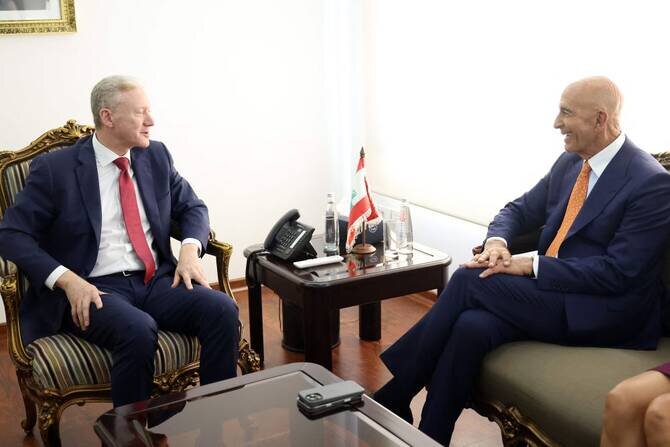Concern over Barrack’s political storm: Will the trick of former US envoys be repeated?

BEIRUT — Observers took note of the unusually optimistic tone expressed by U.S. Special Envoy to Syria, Thomas Barrack, particularly in light of the heightened rhetoric suggesting that Lebanon could face major escalation if it failed to comply with his proposal to disarm Hezbollah.
Upon receiving the official Lebanese response, Barrack affirmed that he was “grateful and satisfied”. So how can this be understood?
Informed sources pointed out that these positive compliments do not necessarily mean the end of the threat, as the U.S. demand has not changed pending the outcome of the looming meeting between the U.S. President Donald Trump and Israeli Prime Minister Benjamin Netanyahu.
The sources revealed that Barrack sought, through his soft diplomacy, to portray the issue of the Resistance as a purely local crisis, with the Lebanese government either doing what is necessary or being left to an unknown fate!
The most notable was the U.S. envoy’s meeting with Lebanese Forces leader Samir Geagea, who described the Lebanese response as “unconstitutional,” demanding that the U.S. proposal be discussed within the government.
Geagea had urged Barrack to intervene to prevent the Lebanese authorities from stalling the disarmament of Hezbollah. Barrack assured him that “this issue concerns you, the Lebanese.”
Barrack was frank in not counting on a role for Lebanon’s anti-Resistance team, but rather bluntly declared his country’s “unwillingness” to fight their battles on their behalf.
During his first visit to Lebanon, Barrack appeared to be under the illusion that the U.S. administration—acting in alignment with Israeli interests—was on the brink of toppling the Islamic Republic in Iran, and by extension, bringing about the downfall of Hezbollah.
However, after Iran’s victory, and automatically the victory of its allies, including Hezbollah, Barrack’s government realized fully well that Hezbollah would not accept a humiliating surrender.
Thus, they tried to push Riyadh’s envoy, Yazid bin Farhan, to urge the Lebanese government to confront Hezbollah; nevertheless, bin Farhan failed.
When he stated that he could not provide guarantees that Israel would not resort to a new war, Barrack hinted that Israel would deal with Hezbollah in its own way!
Meanwhile, Grand Mufti Sheikh Abdul Latif Derain and the accompanying scholarly delegation met with al-Jolani, Syria’s self-appointed president (currently known as Ahmad al-Sharaa), who heard from the Mufti of Hasbaya and Marjayoun, Sheikh Hassan Dali, regarding the Lebanese identity of the Shebaa Farms.
Dali confirmed that the Lebanese Waqf owns approximately 30 million square meters within these farms.
Al-Jolani responded, “At the present time, we cannot discuss whether these farms are Lebanese or Syrian as long as they have not been liberated from Israel. After the liberation, we will discuss the matter.”
Off-topic, al-Jolani expressed his dissatisfaction with the continued detention of his terrorists in Lebanese prisons, claiming that they “were fighting the former regime,” noting that his foreign minister would soon visit Lebanon to discuss the matter.
Concurrently with Derain’s visit, Hebrew media reported that Damascus was demanding the annexation of the Lebanese governorate of Tripoli to Syria; hence, what kind of war is being planned against Lebanon in the coming days?
Leave a Comment